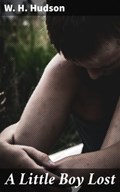In "A Little Boy Lost," W. H. Hudson crafts a poignant exploration of childhood innocence and the profound connection between nature and the human spirit. Written in a lyrical style that captures the beauty of the English countryside, the novel follows the journey of a young boy as he grapples with the complexities of life, loss, and the inexorable march of time. Hudson'Äôs vivid prose immerses readers in a world where the simplicity of childhood is often overshadowed by the harsh realities of adulthood, making the narrative a reflective commentary on the transient nature of youth and the bittersweet memories that define it. W. H. Hudson, an English writer and naturalist of Argentine heritage, often drew inspiration from his own tumultuous experiences. Having faced numerous hardships in his early life, including illness and the challenges of relocating to England, Hudson possessed a deep understanding of the interrelationship between man and nature. His multifaceted background informed much of his writing, infusing it with an authenticity that resonates throughout "A Little Boy Lost," making it a unique addition to the literary canon of childhood literature. For readers seeking a profound yet accessible exploration of childhood's fleeting moments, "A Little Boy Lost" is an essential read. Hudson'Äôs rich, evocative language invites us to reflect on our own experiences as children, urging a sense of nostalgia while simultaneously prompting deeper contemplation about the passage of time and its implications on innocence.

